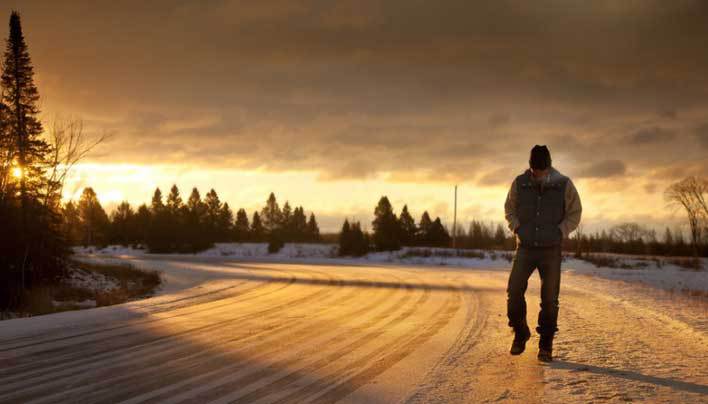
I sometimes have to go out of town on business just like millions of other people each year. The distance and locations all vary with the need, but in a lot of cases, I am unable to be as equipped as I would normally be around my home town. In some cases, I travel internationally, but that is rare. Sometimes I only travel an hour or two by car so I opt to drive. In this type of situation, I can take my Get Home Bag and usually a firearm (or two) with me. Most often it is several hundred miles away from home and to cities where firearms are not allowed. On business trips, it is harder to pack your survival supplies in sufficient quantities to last if some disaster happened and you needed to get home.
I started to consider what a person would need to think about and could possibly face if they were in a situation where an EMP was exploded over the US, total chaos ensued and you were forced to make it back home over a considerable difference. In my scenario, the distance would be about 700 miles and the assumptions with an EMP would be that there were not many electrical devices working. All cellular communications would be down as well as landlines were out of commission. TV and Radio networks had been taken offline even if some of the TV sets and radios themselves still worked. I don’t imagine every single electronic device in the world would go out forever, but it would be enough to create massive confusion, fear, and panic.
In addition to communication and access to news all access to money was cut off. Banks would slam shut and a bank holiday would be declared. Hospitals would quickly fill with the sick and injured and you would be on your own. How would you get back home and what would you need to consider if your home was 700 miles away and you had no survival supplies and no way to procure them.
Plan before you travel
The average, healthy person on level terrain can comfortably walk about 20 miles in a day. In our scenario above, with no issues whatsoever, it would take you about 35 days to walk back home if you didn’t stop anywhere to take pictures. That is a very long time to be walking. There are a myriad of issues to consider in even starting a challenge like that. Most backcountry hikers, who have plenty of gear and some expectation they are going to be roughing it, rarely set out on trips that long. Even backpackers, who hike the Appalachian Trail stop into towns, eat hot meals and pick up packages of goods they have stored along the way. How will you with minimal supplies even begin to hope to make it home alive? There are some items that I think you would need to have squared away in your mind first.
- Should you stay in place or set out on foot?
- What gear will you need?
- How will you eat?
- What route will you take?
Should you stay or should you go?
This will be the first mental challenge that you will be faced with and could determine if you will live or die. In all seriousness, the plans you make and more importantly your actions affect the situations down-line that you find yourself in. We have all probably heard stories about travelers who had a “gut-feeling” that they shouldn’t get on a plane and the plane ended up crashing. Similarly, your “gut” is going to be screaming at you in a disaster. It is the well-known fight or flight response and you will need to figure out for yourself what you will be capable of doing mentally and physically before you set out on any expedition.
Hiking for over a month is a very monumental task that not a lot of people (including me) have any experience with. In days long past, a travel plan like this wasn’t so far out of the norm. We haven’t always had cars, trains and wagons to get us around and people walked. This is certainly doable, but for a lot of very good reasons, people didn’t live as long back then. Journeys of this scale take time, planning and skills.
Deciding whether or not you would even consider a trek like this is something you can do now. I know that I personally would. I don’t know if I would make it, but I would be on the road somewhere. In my situation above, I would stick around a couple of days most likely to procure supplies, get any information I could, plan and prepare. I think that a couple of days after an EMP attack everyone will be in shock, but that won’t last long. Eventually, people will panic and that is when you don’t want to be around. My wife already knows that if something like this happens, I am headed home but it might take me a while.
What gear will you need?
As I said in the introduction, if I am driving anywhere, I pack a lot of supplies that would help me get back home in a disaster scenario like this. If you weren’t able to pack your Get Home Bag or any firearms, what would you do?
It helps to consider the journey back home and the different factors that you will encounter. Is this winter or summer? Will you have extreme temperature that needs to be planned for. What will you use for shelter? Security?
A good exercise if you find yourself in a scenario like this is to take stock of what you have. Empty your pockets of everything and conduct a simple inventory. When I travel, regardless of where I go I always have a bandanna, flashlight, multi-tool and small hank of paracord. These items can really come in handy, but they wouldn’t be the only things I would count on to get me back home over 700 miles away. Depending on the season, I would try to acquire additional clothing if I needed it, but usually, I pack appropriate clothes for wherever I am going. What I don’t normally pack are clothes designed for living out in the woods for a month. Some modifications might have to happen.
A simple tarp and rope/bungie cords will provide shelter for you and will keep the elements off your head while you sleep. A big sheet of plastic would do the same. Is it the same as a nice backpacking tent? No, but it works and is lighter and speaking of lighter… You need an easy way to start a fire also.
Great walking shoes that are already broken in would be a huge advantage. Actually, I think sturdy leather boots would be the perfect choice, but some people might have to hike back in dress shoes. If possible, I would look for boots as quickly as you can after deciding you are walking.
For security, you have to take what you can get if the grid crashes like this. At a minimum, I would find a large stick or pole. Baseball bat would be my second choice but may be harder to find than a good old wooden stick. This needs to be sturdy enough to use as a walking stick or club to crack someone’s head open with if necessary. Additionally, it can be used to support your tent.
Money could either be worthless or crucial to you getting supplies in an EMP event. If you have your head screwed on tightly and have cash on hand, you may be able to run down to the sporting goods store and buy some needed supplies before you make your trip. When I travel I always try to have cash in my wallet. It isn’t enough to buy out the store but could get me some crucial supplies.
I would caution you though to try and maintain a low profile. If you are all set up for a big backpacking expedition with the latest bag, gear, and clothes you may be a target. Someone might want what you have (because they can’t get it) and try to take it from you. It’s better to keep a low profile and low weight will help the trip too.
I would try to fit everything I needed into a standard size backpack that most everyone has. This way you will look just like everyone else headed home.
How will you eat?
This will probably be the toughest part about a journey like this in my opinion. I think most people can walk long distances. Most people will be able to carry or find some relatively decent source of water, but most people won’t be able to find food. What do you do?
There is no way you could ever pack enough food to last you your entire journey. You more than likely won’t be able to set up traps like Bear Grylls and catch rabbits or fish from a stream with your pocket survival kit, but I could be wrong. I think a lot of people are going to be going several days at a time without food. Could you hole up somewhere and catch wild game? Of course, you could and I am not knocking those skills. What I am going to try to do though is to get home as quickly as possible.
This may be where timing comes into play. Food from grocery stores will be wiped out in days. You could be one of the early birds and grab enough food to last you a week or so and set out. After that week, you will need to find food along the way. Will people have any to sell you or will there be some form of bartering set up already? I don’t know, but I think the sooner you can get home the better. As the realization that the power isn’t coming back on hits, people will be stingier with their food I imagine. The old rule is you can go 3 weeks without food but I don’t want to try and put that to the test.
What route will you take?
The final item to consider is how will you get back home. What route are you going to take to get there and this is where having maps will be invaluable for a couple of reasons. First, you want to plan your route and make sure you know which way you are going. I have on more than one occasion gone the wrong way and had to turn around and backtrack. It’s easy to do this for twenty miles in a car, but if you are walking and realize you took a wrong turn, that could waste a day.
The second reason is I would use secondary roads as much as possible and not highways. I would also try to steer clear of major cities in my path. A highway is faster if you are traveling 70 miles an hour, but it might not be the most direct route you can take. Maps that show the secondary roads to your home will be good to have. Some may even be able to help you determine good places to stay. I would personally camp outside of cities and avoid people as much as possible, but I would want the flexibility to change that plan if needed. Everyone’s circumstances will be unique.
Hopefully, this was useful and gave you something to think about as you plan for your next trip. Please let me know if you have other suggestions in the comments below.




















